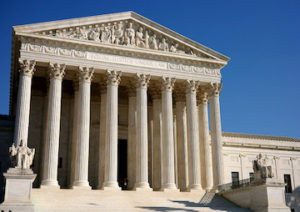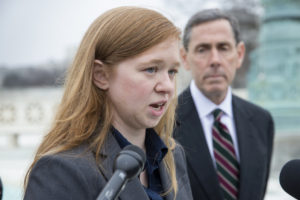Supreme Court’s Affirmative Action Decision: A Whimper, Not a Bang
The Supreme Court on Monday finally issued a ruling on the case challenging the University of Texas at Austin's race-conscious admissions program that it heard eight months ago, but it was by no means a sweeping decision on the issue of affirmative action.
The Supreme Court on Monday finally issued a ruling on the case challenging the University of Texas at Austin’s race-conscious admissions program that it heard eight months ago. But instead of a sweeping decision, the justices voted 7-1 to send the program back to a federal appeals court to review again.
Although effectively allowing affirmative action to survive for now, the high court clarified the legal standard for college admissions programs that weigh race in their decisions. As a result, UT-Austin may find it more difficult now to prove that its program is constitutional.
In the majority decision, Justice Anthony Kennedy wrote that although affirmative action remains permissible for college admissions programs, schools must prove there are “no workable race-neutral alternatives” to ensure a diversified campus.
“Once the University has established that its goal of diversity is consistent with strict scrutiny, however, there must still be a further judicial determination that the admissions process meets strict scrutiny in its implementation. The University must prove that the means chosen by the University to attain diversity are narrowly tailored to that goal,” Kennedy wrote. “Narrow tailoring also requires that the reviewing court verify that it is ‘necessary’ for a university to use race to achieve the educational benefits of diversity.”
He added, “This involves a careful judicial inquiry into whether a university could achieve sufficient diversity without using racial classifications.”
The justices, however, stopped short of saying whether UT-Austin’s program met their requirement.
Justice Ruth Bader Ginsburg was the lone dissenter. Justice Elena Kagan recused herself, presumably because she worked on the case while serving as the solicitor general in the Obama administration.
NBC News:
The case was brought by Abigail Fisher, a white woman who applied to the university in 2008 and was denied, and claimed that her constitutional rights and federal civil rights laws were violated.
The Supreme Court ruled that the appeals court had failed to hold the university to a “demanding burden of strict scrutiny.” Instead, the appeals court “presumed that the school had acted in good faith” and required Fisher to show otherwise, the high court found.
The burden of proof is on a university to show that “each applicant is evaluated as an individual and not in a way that makes an applicant’s race or ethnicity the defining feature of his or her application,” the ruling said, quoting language from a previous opinion.
…The decision is not the court’s final word on affirmative action. It has agreed to take a case in its next term about whether voters can decide at the polls to ban affirmative action in their states.
With Fisher v. the University of Texas finally decided, that still leaves three major cases for the court to rule on this term. One centers on a provision in the Voting Rights Act and two involve same-sex marriage. The Supreme Court is expected to issue more decisions Tuesday and on at least one other day. The court’s term traditionally ends in June, but it’s not unprecedented for the justices to release rulings beyond that.
— Posted by Tracy Bloom.
Your support matters…Independent journalism is under threat and overshadowed by heavily funded mainstream media.
You can help level the playing field. Become a member.
Your tax-deductible contribution keeps us digging beneath the headlines to give you thought-provoking, investigative reporting and analysis that unearths what's really happening- without compromise.
Give today to support our courageous, independent journalists.







You need to be a supporter to comment.
There are currently no responses to this article.
Be the first to respond.